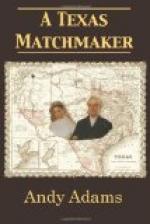“Yes; it would be a good idea. How in the name of common sense could you expect young sap-heads like you boys to understand anything about a woman? I know what I’m talking about. A single woman never shows her true colors, but conceals her imperfections. The average man is not to be blamed if he fails to see through her smiles and Sunday humor. Now, I was forty when I married the second time, and forty-five the last whirl. Looks like I’d a-had some little sense, now, don’t it? But I didn’t. No, I didn’t have any more show than a snowball in—Sis, hadn’t you better retire. You’re not interested in my talk to these boys.—Well, if ever any of you want to get married you have my consent. But you’d better get my opinion on her dimples when you do. Now, with my sixty odd years, I’m worth listening to. I can take a cool, dispassionate view of a woman now, and pick every good point about her, just as if she was a cow horse that I was buying for my own saddle.”
Miss Jean, who had a ready tongue for repartee, took advantage of the first opportunity to remark: “Do you know, brother, matrimony is a subject that I always enjoy hearing discussed by such an oracle as yourself. But did it never occur to you what an unjust thing it was of Providence to reveal so much to your wisdom and conceal the same from us babes?”
It took some little time for the gentle reproof to take effect, but Uncle Lance had an easy faculty of evading a question when it was contrary to his own views. “Speaking of the wisdom of babes,” said he, “reminds me of what Felix York, an old ’36 comrade of mine, once said. He had caught the gold fever in ’49, and nothing would do but he and some others must go to California. The party went up to Independence, Missouri, where they got into an overland emigrant train, bound for the land of gold. But it seems before starting, Senator Benton had made a speech in that town, in which he made the prophecy that one day there would be a railroad connecting the Missouri River with the Pacific Ocean. Felix told me this only a few years ago. But he said that all the teamsters made the prediction a byword. When, crossing some of the mountain ranges, the train halted to let the oxen blow, one bull-whacker would say to another: ’Well, I’d like to see old Tom Benton get his railroad over this mountain.’ When Felix told me this he said—’There’s a railroad to-day crosses those same mountain passes over which we forty-niners whacked our bulls. And to think I was a grown man and had no more sense or foresight than a little baby blinkin’ its eyes in the sun.’”
With years at Las Palomas, I learned to like the old ranchero. There was something of the strong, primitive man about him which compelled a youth of my years to listen to his counsel. His confidence in me was a compliment which I appreciate to this day. When I had been in his employ hardly two years, an incident occurred which, though only one of many similar acts cementing our long friendship, tested his trust.




